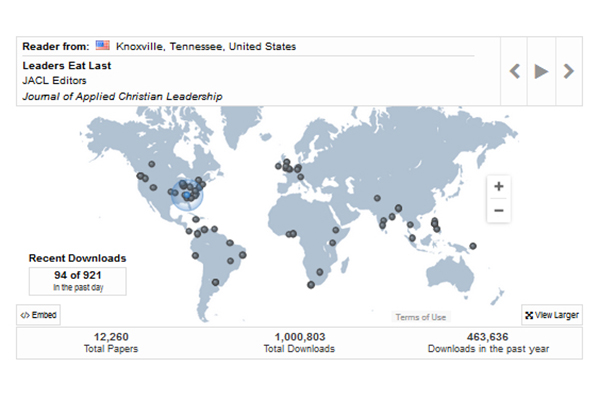
A snapshot of areas around the world where institutions and individuals have recently downloaded items from Digital Commons, image courtesy Terry Robertson
August 29, 2018, marked the millionth download from Digital Commons at Andrews University.
“For the number of documents in the repository, and the size of our university, achieving this milestone in just over three years is remarkable. It says something wonderful about our students and our faculty and the relevance of our scholarly work in the global marketplace,” says Terry Robertson, associate dean of libraries and repository librarian at the James White Library.
Digital Commons (DC) at Andrews University is an innovative online institutional repository provided as a service of the University’s library system. Research and creative scholarship included on the DC website have been selected and deposited by individuals, as well as corporately by the various University departments and centers. DC was launched June 1, 2015, and since that time more than 12,260 pieces have been archived in the collection. Just over 50 percent of the downloads are from student scholarship, and 35 percent are from the six journals available in the DC.
“We worked a lot through the provost’s office, key faculty members, and deans council. From there it expanded until most faculty have gotten excited about this,” says Larry Onsager, dean of libraries.
Digital Commons seeks to provide both the faculty and students of Andrews with a voice in global conversations through their research and creative scholarship. Additionally, it aids in telling the Andrews story through the digital archiving of campus publications, public documents, and images. DC also helps share the unique teaching resources of Andrews for the benefit of the global community.
“We have a rich heritage of research here, and we’re starting to share that heritage around the world in a digital way. We’re starting to see our name pop up in some cool places as a result,” says Robertson.
Digital Commons also provides a record of faculty scholarship. This scholarship record is organized by year on faculty members’ respective department pages, and, also, by discipline in the Expert Gallery. Each faculty member with deposited works has a personal SelectedWorks page featuring their contributions. In addition, DC allows all its authors to see where in the world their research has been downloaded and what institutions have accessed it.
Eventually DC would like to have archives of images as well, particularly of archaeological items, or images of all the trees on campus, since the University is an arboretum.
“In the last 30-day period, visitors from 191 countries downloaded a document from [Digital Commons]. This is typical and shows a global impact,” says Robertson. “We can also track downloads to institutions, and it is appreciated how many sister Seventh-day Adventist universities from around the world are discovering and using our content. Ten of the top 20 users are Adventist universities, including representatives from North America, Africa, South America, and Australia.”
Founded in 1874, Andrews University is the flagship institution of higher education for the Seventh-day Adventist Church and offers more than 200 areas of study including advanced degrees. Its main campus is in Berrien Springs, Michigan, but the University also provides instruction at colleges and universities in 19 countries around the world.
— Gillian Sanner Panigot is media communications manager for Integrated Marketing & Communication at Andrews University.
